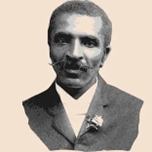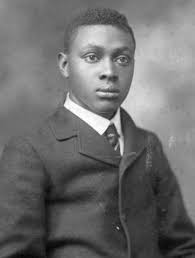Thought leadership
- Date 29 October 2024
- Words by Carl Atkin-House
- Reading time 3 mins
The Contribution of Black People to Agriculture and Forestry
Honouring their legacy during Black History Month

Introduction
Black History Month is a time to reflect on and celebrate the invaluable contributions of Black individuals and communities across a wide range of fields. Among these, the realms of agriculture and forestry stand out as areas where Black people have made significant and lasting impacts. From the early days of colonialism and enslavement to the present, their influence has been profound, shaping the landscape and practices of these industries in ways that are often overlooked.
“ One of the most notable figures is George Washington Carver (1864-1943), an American agricultural scientist, who promoted crop rotation in an era when monocultures of cotton were common.”
Agriculture
Colonialism
Colonialism had a significant impact on agriculture and forestry in various ways, influencing social structures, economies, and ecosystems across colonised regions. Many of these impacts were profoundly negative: land dispossession and resource exploitation created many challenges and colonial agricultural policies often undermined indigenous knowledge and practices, leading to a loss of cultural identity and traditional ecological knowledge.
The Era of Enslavement
During the period of enslavement in the United States and other developed nations, Black individuals were the backbone of the agricultural economy. They brought with them a wealth of agricultural knowledge from Africa, including techniques in crop cultivation, soil management, and livestock care. Enslaved people were responsible for the cultivation of staple crops such as tobacco, rice, indigo, and cotton, which were central to the economy of the southern United States. Their labour and expertise in these areas were crucial to the development and prosperity of agriculture in many developed and colonial countries.

Innovations and Inventions
Despite the oppressive conditions of colonialism and slavery, Black individuals made significant contributions to agricultural technology. One of the most notable figures is George Washington Carver (1864-1943), an American agricultural scientist, who promoted crop rotation in an era when monocultures of cotton were common. His work on preventing soil depletion was pioneering; while a professor at Tuskegee Institute he oversaw the publication of over forty practical bulletins for farmers, including combating soil depletion with limited financial means, producing bigger crops, and preserving food.
Another prominent agricultural innovator was the American Henry Blair (c. 1807–1860) who was the second African American inventor to receive a US patent for seeding machines for corn (patented 1834) and cotton (1836) both of which reduced labour and improved crop production efficiency. Unbelievably, just over twenty years later the law was changed stating that enslaved people could not hold patents. Eleven years after Blair’s death in 1871 that law was finally rescinded.
Post-Emancipation Contributions
Following emancipation in the United States, many Black individuals continued to play a crucial role in agriculture, often as sharecroppers and tenant farmers. Despite facing systemic racism and economic exploitation, they persevered and developed resilient farming communities. Organizations such as the Colored Farmers’ National Alliance and Cooperative Union, founded in the late 19th century, provided support and advocacy for Black farmers, promoting cooperative buying and selling to counteract discriminatory practices in the marketplace.
“ Organizations such as the Colored Farmers' National Alliance and Cooperative Union, founded in the late 19th century, provided support and advocacy for Black farmers, promoting cooperative buying and selling to counteract discriminatory practices in the marketplace.”
Forestry
Since professional forestry began in the early 20th century, the cultural narrative about who cares about, works on, and belongs in forests has been dominated by white men. And yet, the first Black professional forester was one of the first men of any race to graduate with a forestry degree in the United States.
Ralph Elwood Brock (1881-1959) was an American forester and protégé of Joseph Timble Rothwick, a pioneering environmentalist. Graduating from the Pennsylvania State Forestry Academy in 1906, he worked as the nursery superintendent from 1906 to 1911. Brock was the first academically-trained African American forester in the United States.

Although his public career was cut short by the relentless racism of the white students at the Academy, Brock continued the work he loved in the private sector, starting his own nursery business in Philadelphia. Brock wasn’t the only one – in 1910 Black Americans owned 195 timber companies and comprised about twenty-five percent of all employees in the forest industry.
In the modern era, Black environmentalists and foresters continue to advocate for the preservation and sustainable management of natural resources. Dr. Wangari Maathai, a Nobel Peace Prize laureate from Kenya, is a prominent example. Her work in reforestation and environmental conservation through the Green Belt Movement has had a profound impact on sustainable forestry practices globally.
Challenges and Future Directions
Systemic Barriers
Despite their significant contributions, Black individuals in agriculture and forestry have faced and continue to face systemic barriers. These include limited access to land and capital, discriminatory lending practices, and exclusion from decision-making processes. Addressing these challenges is essential to ensuring that Black farmers and foresters can thrive and contribute to the future of these industries.
Empowerment and Community Support
Empowering Black individuals and communities in agriculture and forestry requires concerted efforts to provide education, resources, and support. Initiatives that promote land ownership, access to affordable credit, and the development of cooperative enterprises are crucial. Additionally, celebrating and amplifying the successes and contributions of Black agriculturalists and foresters can inspire future generations to pursue careers in these fields.
Conclusion
The contributions of Black people to agriculture and forestry are vast and deeply rooted in history. From the era of colonialism and enslavement to modern-day innovations, their impact has been transformative. As we honour their legacy during Black History Month, it is important to recognize their achievements, address the challenges they face, and support their continued contributions to these vital industries. By doing so, we can ensure a more equitable and sustainable future for all.

